
News (832)
Aarong chief receives international women’s leadership award
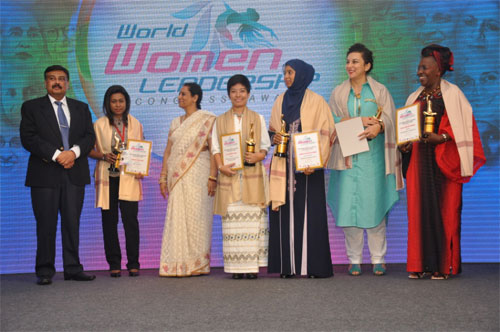
25 February 2014, Dhaka. Tamara Hasan Abed, senior director of BRAC Enterprises, was honoured with the Outstanding Women Leadership Award by the World Women Leadership Congress on 14 February in Mumbai, India.
“I am truly privileged to receive this award and to be considered among successful women leaders. I would like to accept this on behalf of the many women who have influenced my life, particularly those in my country of Bangladesh. Women are on a remarkable journey towards equality, marked with struggles and victories. This award is symbolic of yet another victory and I hope it will inspire more girls to lead,” said Ms Abed, who is head of the leading retail chain Aarong.
Women leaders from across the world attended the two-day conference, including the former minister of women’s affairs for Afghanistan, Dr Sima Samar, the president and CEO of UN Women Canada, Almas Jiwani and the managing director of HBO Asia, Monica Tata. Ms Abed, who is the daughter of BRAC’s founder Sir Fazle Hasan Abed, also spoke on a panel discussion about the opportunities and challenges facing women leaders.
BRAC Driving School starts driving training course for Bangladesh Police Officials
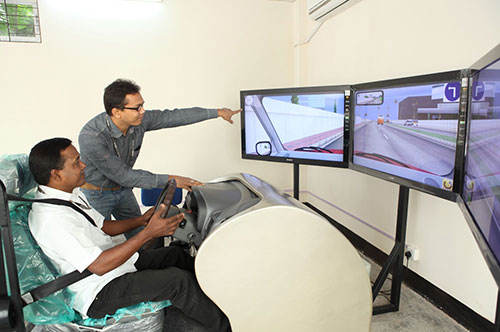
23 February 2014, Dhaka.
BRAC Road Safety Programme has started a Basic Driving Training course for 20 constables and sub-inspectors of Bangladesh Police from 23 February, 2014 at BRAC Driving School, Uttara. The aim of the 33 days training programme is to provide basic driving training for promoting safe driving practises among the novice drivers. The BRAC Driving School, established in May 2012 conducts a variety of driving courses such as driver instructors, professional women drivers, Surakkha-road safety & defensive driving training for in-service bus and truck drivers etc. through the use of digitised bar coded training manual, driving simulator, visual impairment system and P-drive system etc.
BRAC’s Intervention in increasing resilience of agriculture and aquaculture systems in the south
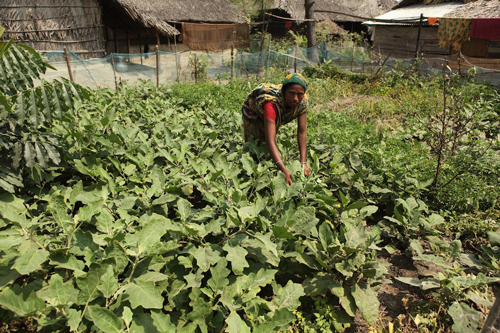
19 February 2014, Dhaka. Cultivation of rice, jute, sunflower, tomato should be increased to face the climate change affects in Bangladesh. Lack of sustainable process to reduce salinity in the water is one of the major challenges here, agro-experts suggested in the workshop held on Tuesday 18 February at BRAC Centre Inn. They also mentioned, that attention is needed in increasing the production as well as creating a market for the harvested crops.
In the keynote presentation, the programme Head of BRAC’s agriculture and food security programme (AFSP) Dr. Md. Sirajul Islam stressed on expanding the climate change adaptive technology amongst the farmers of our country.
Md Abu Hanif Miah, Director General, Department of Agricultural Extension (DAE), Ministry of Agriculture, Government of the People's Republic of Bangladesh and Kamal Uddin, Executive Chairman of Bangladesh Agricultural Research Council (BARC) were present as special guests at the event. Mr. Anwar Faruque, Director General, Seed Wing and Additional Secretary, Ministry of Agriculture, Government of the People's Republic of Bangladesh was the chief guest of the event. BRAC’s senior director Babar Kabir chaired the event and programme head of Communications and Advocacy for Social Change, Snigdha Ali gave the welcome speech.
Global launch of the Lancet series in New York
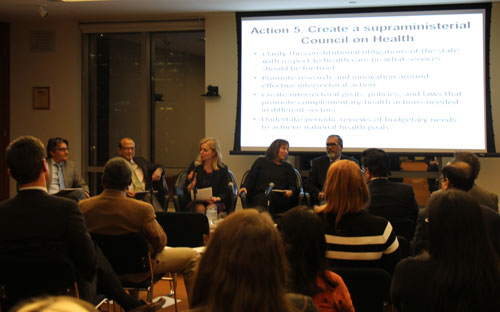
BRAC’s vice-chair and interim executive director (ED), Dr Ahmed Mushtaque Raza Chowdhury, attended the global launch of the Lancet series on Bangladesh in New York on 15 January 2014. The event was held by the Bangladesh Permanent Mission to the UN, UNICEF and the Rockefeller Foundation.
Last year, the Lancet medical journal published a special research series highlighting accomplishments in Bangladesh’s health sector. Despite widespread poverty, exceptional improvements in maternal child health, immunisation coverage, and tuberculosis control were part of this remarkable success story. BRAC’s own health programme and extensive community-based health network were identified as crucial contributing factors to these achievements.
Major highlights of the event were a presentation on the significant findings from the series, followed by a panel discussion. Those attending the event included the special guest, Bangladesh’s Permanent Representative to the UN, Dr AKA Momen, Dr Abbas Bhuiya, co-author of the Lancet series, and 70 other guests including UN diplomats, academics, development partners, media representatives were present at the event.
Find the details on Lancet series: http://www.thelancet.com/series/bangladesh
BRAC Liberia signs an agreement with the Ministry of Health and Social Welfare in Liberia

In partnership with the Ministry of Health and Social Welfare, BRAC Liberia has signed a global fund sub recipient consultancy contract with the Ministry. The objective of this contract is to provide a framework which would allow the sub-recipient provide community based Tuberculosis (TB) Directly Observed Therapy (DOTs) services under the round ten Global Fund’s TB Grant. This will strengthen the TB control and management of people with TB/HIV co-infection in Liberia. The signing took place on December, 23 2013
Continued eye care services for the people of Sylhet
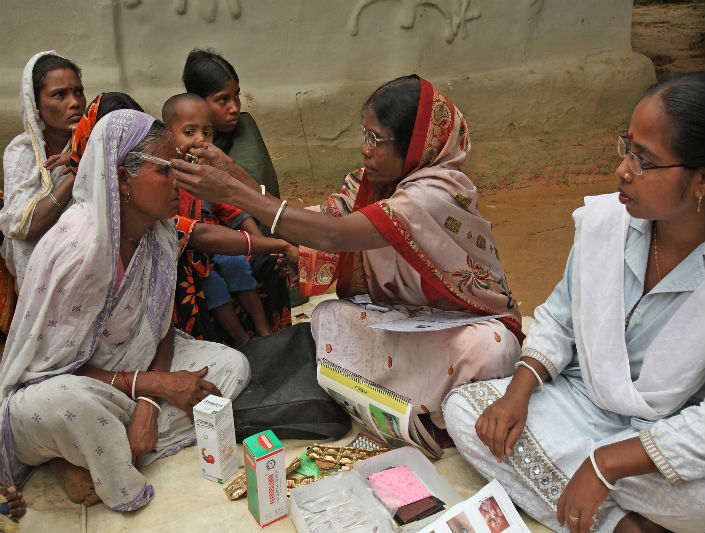
In an event held at BRAC Centre on December 22, 2013, Secretary for Ministry of Health and Family Welfare Mr.M M Neazuddin mentioned that Vision Bangladesh project should be replicated all across the nation. Terming access to eye healthcare as a basic right of the people, he stressed on the need to excel eye care services for improved quality of life of the community people. He further mentioned that the Ministry will provide all out support for the implementation of this intervention.
Vision Bangladesh Phase- I is a unique intervention implemented by BRAC and Sightsavers under the guidance of National Eye Care (NEC) which aims to avert preventable blindness through cataract surgery. The Public Private Partnership (PPP) model in implementing this project in the grassroots has created an example itself mirroring that such coordinated initiatives can bring about dramatic outcomes.
According to Bangladesh National Blindness and Low Vision Survey 2000 about 750,000 adults aged above thirty years are completely blind out of which eighty percent are due to cataract related complications. The survey also mirrors that about five million people including children suffer from refractive errors. Evidence suggests that about 90% of such blindness and low vision can be prevented with proper and timely management.
Dr. Kaosar Afsana, Director of BRAC’s Health, Nutrition and Population Programme mentioned that about 110,000 cataract surgeries were conducted in Sylhet division in phase-I and now the project is scaling up to 10 urban areas along with few selected rural districts. She further mentioned that NEC’s continuing support and guidance has made vision Bangladesh a successful role model in the eye care services.
Prof. Dr. Deen Mohd. Noorul Haq Line Director, National Eye Care-DGHS and Director cum Professor, National Institute of Ophthalmology & Hospital mentioned that BRAC has shown remarkable progress in mobilizing and counselling patients in the rural area further stating that the target of 100,000 for three years cataract surgeries could not be reached before the end of project period without the extensive support of BRAC.
Later a memorandum of understanding (MoU) was signed between National Eye Care and BRAC which will allow BRAC to continue its operation in Sylhet division for addressing upcoming cataract cases and hard to reach areas.
One billion to rise in 2014
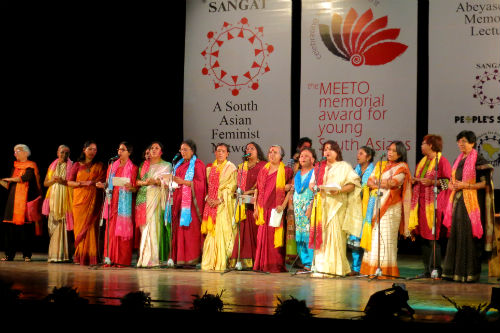
Every week in Bangladesh, more than 10 women suffer from some form of violence. In India, 22 women are killed every day in dowry-related murders, while in Sri Lanka, 60 per cent of women report having suffered physical abuse. Additionally, in Pakistan, more than 450 women and girls die every year in so-called “honour killings,” and incidents of human trafficking in Nepal are still highly prevalent.
Numerous women’s rights organizations and NGOs have taken the initiative to fight against violence and discrimination against women in South Asia. One Billion Rising (OBR), a global campaign to end violence against woman, took place on February 14, 2013. In Bangladesh approximately three million men and women gathered on the streets with support from over 400 organizations across 206 countries.
On November 30, 2013, One Billion Rising for Justice (OBR4J), the second phase of the campaign, was launched in Bangladesh at the Shilpakala Academy, in Jatiya Natyashala, Dhaka. The launch was organised by Sangat, a South Asian feminist network and Nijera Kori, Bangladesh. The event included introductions from writer, feminist and coordinator of OBR’s South Asian chapter, Kamla Bhasin, and women’s rights activist and coordinator of OBR Bangladesh, Khushi Kabir. There was also a memorial for feminist activist, Sunila Abayasekara, announcement of the Meeto Memorial Award for social commitment, and songs dedicated to South Asian women and their struggles.
Kamla Bhasin launched the South Asian chapter of the second phase of this campaign, calling on men and women to rise against injustice. She said, “This is the greatest war ever, and violence against women cannot and will not be tolerated anymore. We have been fighting this battle for centuries, for decades and the time is put our concerted efforts [together].”
OBR4J is an invitation to break free from confinement, obligation, shame, guilt, grief, pain, humiliation, rage, and bondage. It a revolutionary global call to survivors to release their stories through art, dance, marches, ritual, song, spoken word, or testimonies.
The launch included dance performances by the group Shadhona. A flash mob was also performed by a group of women who work in the ready-made garments (RMG) industry. These women had also faced violence in the form of acid attacks, domestic violence and sexual assault. Their performance to OBR’s theme song “Break the chain” portrayed the strength and power of women to rise and move forward.
It is within this context that OBR4J South Asia was launched on November 30, 2013. “Our work for this campaign begins now. From today we will rise for justice in every form,” said Kamla Bhasin. In the lead up to the landmark event set to take place on February 14, 2014, numerous events and actions will take place engaging a wide range of stakeholders.
CONTACT:
Chiraranjan Sarker 88 01730347963
Tanveer Ahmed Khan 88 01816361158
One Billion Rising Bangladesh, This email address is being protected from spambots. You need JavaScript enabled to view it.
BRAC receives prize in global $1 million Healthcare Innovation Award to replicate programme in Africa
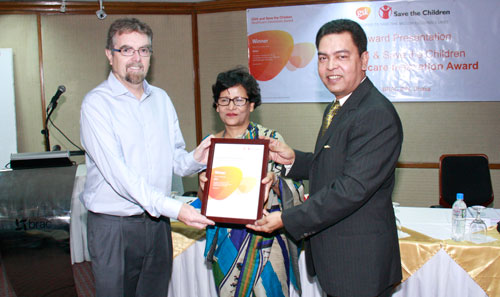
26 November 2013, Dhaka.
- BRAC recognised for its comprehensive mother, infant and child health package
- The Award is the first initiative delivered as part of ambitious partnership between GSK and Save the Children that aims to save a million children’s lives
An innovative programme by development organisation BRAC transforming health for women and children in Dhaka’s slums has been awarded a prize in the first global GSK and Save the Children $1million Healthcare Innovation Award.
BRAC is one of five organisations, from a long list of nearly 100 applications from 29 countries from across the developing world, selected to share the award. It will receive $300,000 to pilot test its programme, called Manoshi, in the slums of Freetown, Sierra Leone, where under-five and maternal mortality rates are amongst the highest in the world.
The Manoshi programme offers a comprehensive package of health services to mothers, infants and children. To meet their health needs and challenges, Manoshi has three key innovations that provide holistic solutions, including:
- Simple, clean delivery rooms for new mothers
- Quick access to emergency health services for those who could not afford it
- Digital data collection on patients for more efficient health service delivery
The Bangladesh-based NGO, founded in 1972, plays a significant part in the push to reduce Bangladesh’s own under-five and maternal mortality rates, the latter of which has seen a 40 per cent drop in a decade.
A judging panel of experts from the fields of public health and development1, co-chaired by Sir Andrew Witty, CEO of GSK, and Justin Forsyth, Chief Executive of Save the Children, including Dr Abbas Bhuiya, Interim Executive Director of the International Centre for Diarrhoeal Disease Research, Bangladesh, were impressed with the south-led innovation and the viability and impact of Manoshi and its potential to transform health for growing urban populations in Bangladesh and in Sierra Leone.
Azizul Huq, Managing Director at GSK Bangladesh, said: “This remarkable project shows what can be achieved through innovation from within those closest to healthcare challenges faced by developing countries and we are delighted to be able to recognise the hard work of all involved. It has saved lives of mothers and children in Bangladesh and can make a difference for the people of Sierra Leone.”
Dr. Kaosar Afsana, Director of BRAC's Health, Nutrition and Population Programme said: “It is an honour to be recognised and awarded for the work we are doing in Bangladesh through our Manoshi programme. We thank GSK and Save the Children for the award money, which will be used to take the programme to Freetown, Sierra Leone, demonstrating excellent South-South collaboration.”
The partnership between GSK and Save the Children aims to deliver a new model for corporate-charity working to help save the lives of a million children.
BRAC gives mechanical prosthetic limbs to Rana Plaza survivors

Saturday 23 November, 2013, Dhaka.
Twelve disabled survivors from the Rana Plaza building collapse received their mechanical prosthetic limbs from BRAC today at an informal event held at BRAC Brace and Limb Centre (BLBC) in Dhaka, Bangladesh. The development organisation also announced it is providing fixed deposits of BDT 100,000 for each of the 12 survivors to support their long-term rehabilitation.
Since the tragic incident in Savar on April 24, 2013, BRAC has been working in close collaboration with the National Institute of Traumatology, Orthopedics and Rehabilitation (NITOR), Ministry of Health and Family Welfare under the leadership of the Prime Minister’s Office (PMO) to support survivors. So far, BLBC had supported 26 patients in NITOR with free Taylor Braces.
Dr. Zulfikar Ali Lenin, Director Health, Prime Minister’s Office, Prof Kh Abdul Awal Rizvi, Director NITOR, Vice Chairperson of BRAC and BRAC's senior directors were present at the event.
Dr Ali shared how the government had taken the initiative to prepare a list of all victims of the Rana Plaza building collapse, categorised them based on their type of injury and provided emergency healthcare support to the survivors. He also mentioned that the government has taken initiatives to mitigate any repetition of such incidents.
Dr Kaosar Afsana, Director of BRAC’s health, nutrition and population programme (HNPP) said BRAC is happy to play an important role in supporting some of the survivors of the tragic incident and hoped that repetition of such a tragedy would not take place in the future.
Vice-chairperson of BRAC, Dr Ahmed Mushtaque Raza Chowdhury, acknowledged the importance of the garment sector's contribution to the economy of Bangladesh, adding, "Such intra-sector collaboration can ensure delivery of timely and quality services to the community people".
Congratulations to Wasfia Nazreen, on her successful expedition to Mount Vinson, Antarctica
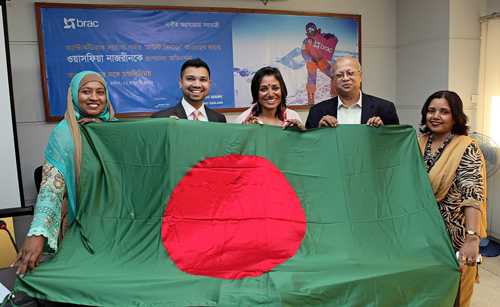
22 January 2013, Dhaka. BRAC organised a press conference on Wasfia Nazreen’s return to the country after her successful expedition to Mount Vinson, the highest point of Antarctica. She reached at Dhaka airport on 22nd January at 9.20 am local time by Qatar Airways where she was received by BRAC officials. She reached the peak of Mount Vinson on 4th January 2013, as the fourth leg of her “Bangladesh on Seven Summits” campaign which kicked off on 26th March 2012.
Executive Director of BRAC Dr Mahabub Hossain, Head of Communication and Service Quality of BRAC Bank Zeeshan Kingshuk Huq, Head of Marketing Sania Mahmood from bKash, and Rashida Parveen from BRAC’s adolescent development programme were present at the press conference. Wasfia handed over the flag of Bangladesh, given to her on the flag-off ceremony of her expedition, to the ED, bKash and BRAC bank officials. The Mount Vinson expedition of Bangladesh on Seven Summits was supported by BRAC in collaboration with bKash Limited and BRAC Bank Limited. Wasfia Nazreen will also work as BRAC’s Goodwill Ambassador for the next one year to champion the cause of women empowerment. Congratulating Wasfia, Dr Mahabub Hossain said he hopes Wasfia “can be an idol for young girls and women to look up to, and that many young girls can draw inspiration from her”.
While sharing her experience of the expedition she mentioned that, “climbing Mount Vinson was a much tougher challenge than Mount Everest, due to cold winds and much lower temperature. However, I started Seven Summits to inspire girls, and I am proud to accomplish this with support from BRAC”.
Wasfia set off on her expedition with a flag-off ceremony on 8th November 2012 to climb Mount Vinson. She reached Canada on 29th November 2012 and underwent a three week long extensive training and acclimatisation in winter wilderness of Canada with Patrick Morrow, the first person in the world to have finished climbing the seven summits 30 years ago. Finally, she left for Antarctica from Chile on 29th December 2012.
On the eve of Bangladesh turning 40, she had taken up the challenge of climbing the highest mountains of each of the seven continents to celebrate women’s progress of the last four decades and highlight to the world the resiliency of our people.
Join the world’s biggest family




